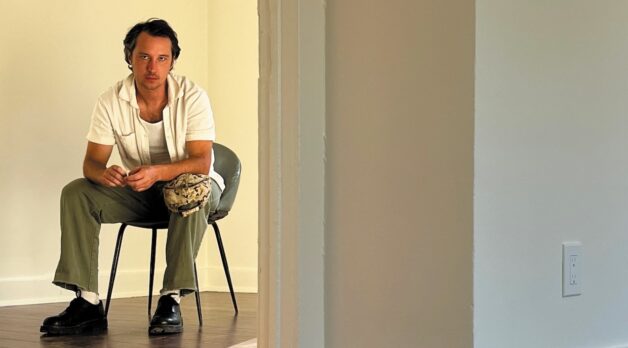Eli Powers
 Eli Powers
Eli Powers

Eli Powers’ unsettling Exuma depicts an asphalt plant worker rapidly spiraling out of control as he waits for an urgent call he can’t afford to miss. His frantic futzing for his phone while working alone on top of a gigantic structure results in him dropping it down a dark hole; searching for it, he finds himself accidentally locked inside the dark pit of this steel hell as his phone continues to vibrate. The man eventually breaks out but appears almost comatose as he continues about his work—that is, before he takes a few gulps of yellow paint right out of the can and loses his mind completely.
Admittedly the first short he’s made where he didn’t have aspirations of “premiering at Sundance” at the back of his mind, Powers cast himself to play Exuma’s man on the verge of a nervous breakdown. Shot on film and framed in 4:3, Exuma also takes place at the asphalt station where Powers’ father now works and where his grandfather did before him. To that end, Exuma is also somewhat autobiographical or, at the very least, a depiction of its director’s deepest internal fears. “It’s sort of like this nightmare perception of what my life [could have been] if I had worked at that asphalt plant,” Powers confesses. “I might have lost my mind, been possessed by some sort of demonic presence, then faded into madness.”
Growing up in a kind of “sleepy, haunted vacation town” on Cape Cod, Powers grew interested in filmmaking years before he had a camcorder at his disposal, leading to his using an audio recorder attached to his family’s karaoke machine while performing the voices of alternating characters, often in conversation as if on a fictional talk show. When his family purchased a MiniDV camera in the early 2000s, Powers and his friends made lo-fi action films with dreams of becoming a professional stuntman like his cinematic hero Jackie Chan, borrowing the white-collar suits of their fathers to play professionally dressed yet baggy-fitted kids who looked like Godfather characters in training. The highlight of each film would be the recreation of a dangerous stunt, typically performed by its director with the help of some clever camera work. “I would jump off the roof of my house,” Powers recalls, “but bring my family’s couch cushions out onto the lawn and have them just out of frame. I really would do the jump [off the roof] but wouldn’t have to land hard on the grass.”
A year after graduating from Emerson’s film production program, Powers returned to Boston to work as a first AD on his directing professor’s feature film (admitting now that it was the second AD who really did all of the work). Powers’ professor mentioned to him that he had a friend who was serving as the unit production manager on Ted 2; with unwavering persistence and some luck, Powers landed a job as the film’s office production assistant (“I was the person who built all of the IKEA furniture in the Ted 2 production office for two weeks”) and was eventually recommended to be the personal assistant of lead actress Amanda Seyfried. Their multiyear professional relationship would grant Powers invaluable access to numerous film sets, including on First Reformed.
Ready to direct his own films, Powers cast Seyfried and her husband, Tony-nominated actor Thomas Sadoski, in Holy Moses, a 14-minute short that spans several decades and two countries. To depict Northern Ireland in 1963, Powers shot for one day in upstate New York; for West Texas in 1989, two days in Palmdale, California. A humorously oddball look at biblical miracles in the least likely of places, Holy Moses screened at several festivals, then Powers again cast Seyfried and Sadoski in the quasi horror short Skin & Bone. A wanderer (Sadoski) looking for work and a place to stay arrives at a woman (Seyfried)’s farm in upstate New York and takes to tending to the animals, eventually falling under the spell of a white horse that encourages the man to enact extreme violence. Creepy and compact, subtle yet gory, Skin & Bone is as close to a horror film as Powers has yet to make; he’s currently developing a feature version of Skin & Bone and is in the casting process.
Now based in Los Angeles but never leaving his roots far behind, Powers also finds himself writing another script, a “Cape Cod detective story that incorporates all of the characters from my childhood and the small-town myths that you’d hear about at a bar. I’m weaving it into his larger, Chinatown-esque detective film. I’m writing for Cape Cod because I miss my home. I live in L.A., but I’m only thinking of the East.”—Erik Luers/Image: Lucy Sandler
